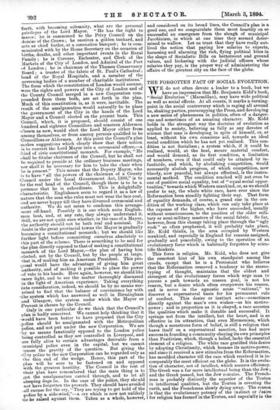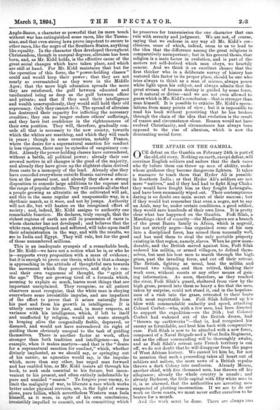THE FORGOTTEN FACT OF SOCIAL EVOLUTION.
WE do not often devote a leader to a book, but we have an impression that Mr. Benjamin Kidd's book, "Social Evolution" (Macmillan), may have wide political as well as social effects. At all events, it marks a turning- point in the social controversy which is raging all around us, shaking parties, preoccupying the Press, and developing a new series of phenomena in politics, often of a danger- ous and sometimes of an amazing character. Mr. Kidd holds in the strongest way the doctrine of evolution as applied to society, believing as fully as any devotee of science that man is developing in spite of himself, or, at least, without his own conscious aid, towards an ideal social condition which he has not yet realised. This con- dition is not Socialism ; a system which, if it could be realised, would, at the best, secure material comfort, and would demand, as its first condition, a limitation of numbers, even if that could only be attained by in- fanticide, and which, by abolishing competition, would necessarily abolish progress, of which competition, now bloody, now peaceful, but always effectual, is the instru- mental method. The condition reached will not even be one of positive social equality, but of "equal social oppor- tunities," towards which Western mankind, or, as we should prefer to say, the whole white race, have ever since the Reformation been steadily fighting their way. That form of equality demands, of course, a grand rise in the con- dition of the working class, which can only take place at the expense of the higher, who have succeeded, usually without consciousness, to the position of the older mili- tary or semi-military masters of the social fabric. So far, however, from this change taking place through the " ugly rush" so often prophesied, it will probably take place, Mr. Kidd thinks, in the area occupied by Western mankind, and especially in England for reasons assigned, gradually and peacefully, owing to the operation of an evolutionary force which is habitually forgotten by scien- tific thinkers.
This force is religion. Mr. Kidd, who does not give the remotest hint of his own standpoint among the creeds, except that he is a Protestant who believes that the Reformation removed a tendency to the stereo- typing of thought, maintains that the oldest and strongest of the evolutionary forces which urge man to pursue a path towards an unseen goal, is not his reason, 'but a desire which often overpowers his reason, and is never in the agnostic sense "rational," to discover a supernatural basis for his permanent rule of conduct. This desire or instinct acts—sometimes directly against the man's own wishes—as his motive- power ; and in proportion as it is obeyed, a race accretes the qualities which make it durable and successful. It springs not from the intellect, but the heart, and is so effective in its attraction, that even Mormonism, which though a monstrous form of belief, is still a religion that bases itself on a supernatuial sanction, has had more success in founding a community obeying its own principles than Positivism, which, though a belief, lacks the essential element of a religion. The white race gratified this desire by adopting Christianity, which became its motive-power, and since it received a new stimulus from the Reformation, has moulded character till the race which received it is in- comparably the most efficient on the globe. It is the evolu- tion of character, not of intellect, which secures efficiency. The Greek was a far more intellectual being than the Jew ; and the Greek passed, but the Jew remains. The French- man is probably distinctly the superior of the Teuton in intellectual qualities, but the Teuton is covering the earth, and the Frenchman slowly dying away. The reason is that the evolutionary potency of the instinct or desire for religion has formed in the Teuton, and especially in the Anglo-Saxon, a character so powerful that its mere touch without war has extinguished some races, like the Tasma- nian, and that even strong laws prove impotent to secure to other races, like the negro of the Southern States, anything like equality. In the character thus developed throughout Christendom, though in unequal degrees, altruism has been born, and., as Mr. Kidd holds, is the effective cause of the great social changes which have taken place, and which are still at hand. For Mr. Kidd maintains that but for the operation of this force, the "power-holding classes" could and would keep their power ; that they are not nearly so overmatched as they were in the Middle Ages ; that the more high education spreads the more they are reinforced, the gulf between educated and uneducated being as deep as the gulf between officer and private ; and that if they used their intelligence and wealth unscrupulously, they would still hold their old supremacy. Only they cannot do it. The spread of altruism has destroyed their capacity for inflicting the necessary cruelties ; they can no longer endure others' sufferings, and they have lost confidence in the righteousness of their own position. They will, therefore, gradually con- cede all that is necessary to the new society, towards which the whites are marching, and which they will reach in peace ; though in some countries, notably France, where the desire for a supernatural sanction for conduct is less vigorous, there may be episodes of sanguinary con- flict. Already the power-holding classes have surrendered, without a battle, all political power; already their one avowed motive in all changes is the good of the majority, and already they have given up the slightest claim derived from caste to a monopoly of the land. Already also they have conceded everywhere outside Russia universal educa- tion at the general cost, and already they show a strong disposition to concede large additions to the expense and the range of popular culture. They will concede all else that a people growing as altruistic as the cultivated will ask, and this in the same regular and unspasmodic way, in a rhythmic march, as it were, and not by jumps. Authority will not die, but will hasten on the recognised effort of society ; and, indeed, Mr. Kidd assigns to authority one remarkable function. He declares, truly enough, that the richest regions of earth are still in possession of races in whom character has not developed ; and believes that the white race, strengthened and softened, will take upon itself their administration in the way, and with the results, we see in India and Egypt. They will rule, but for the good of those unnumbered millions.
This is an inadequate synopsis of a remarkable book, for Mr. Kidd—we have not a notion what he is, or who he is—supports every proposition with a mass of evidence ; but it is enough to prove our thesis, which is that a change is approaching in the attitude of thoughtful men towards the movement which they perceive, and style tp con- ceal their own vagueness of thought, the "spirit of the age." They are growing tired of a formula which, seeming to explain so much, leaves most things that are important unexplained. They recognise, as all patient observers must recognise, that the white man is obeying everywhere some irresistible impulse, and are impatient of the effort to prove that it arises naturally from his past and from his growth in intelligence. It is utterly contrary to his past, and, in many respects, at variance with his intelligence, which, if left to itself and unaffected by religion, would not waste strength in keeping alive the congenitally feeble, depraved, or diseased, and would not have surrendered its right of guiding those obviously unequal to the task of guiding themselves. There is another factor at work, often stronger than both tradition and intelligence—as, for example, when it makes martyrs—and that is the "desire for a supranatural sanction for conduct," which, whether divinely implanted, as we should say, or springing out of his nature, as agnostics would say, is the impulse which, more than any other, has urged man forward and has enabled him, as Mr. Kidd insists all through his book, to seek ends essential to his future, but incon- venient to his present, and often entirely indefensible by pure and unaided "reason." To forgive your enemy, to limit the malignity of war, to liberate a race which works better under physical coercion, are, in the light of reason alone pure follies, which nevertheless Western man feels himself, as it were, in spite of his own conclusions, irresistibly impelled to commit, and in committing which he preserves for transmission the one character that can. rule with serenity and judgment. We are not, of course, saying that we endorse in any way all Mr. Kidd's con- clusions, some of which, indeed, seem to us to lead to. the idea that the difference among the great religions is comparatively unimportant; but in his general thesis, that religion is a main factor in evolution, and is part of the- motors not self-derived which man obeys, we heartily concur. And we think it an excellent chance that the first thinker who in a deliberate survey of history hate restored this factor to its proper place, should be one who. tries always to think as a man of science, always pours white light upon his subject, and always admits that the great stream of human destiny is guided by some force, be it natural or divine—and we are not even allowed to guess which is Mr. Kidd's conclusion—that is stronger than man himself. It is possible to criticise Mr. Kidd's specu- lations from many points of view ; but it is impossible to. read his book without perceiving that he has broken> through the chain of the idea that evolution is the result of reason and circumstance alone. Reason would not have. evolved Christianity, and circumstance has always been opposed to the rise of altruism, which is now the dominating social force.







































 Previous page
Previous page